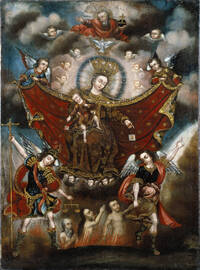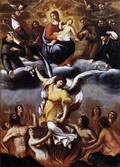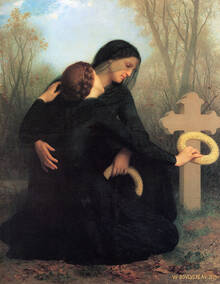All Souls and Purgatory
Commemoration - 2 November, though the whole of the month of November is dedicated to prayer for the Holy Souls.
3 2us by Father Francis Selman ![]()
"Although God’s justice requires that we set right our wrong doing by penance, we can help the souls in purgatory by our prayers, which appeal to the mercy of God. The greatest prayer, of course, is the Mass itself. This is also the most effective prayer for the dead, because the Mass is the sacrifice of Christ on the cross which takes away the sins of the world. Thus the faithful have Masses said for the dead. It is also a matter of charity to pray for the dead, whether for those who are dear to us in this world or for forgotten souls who have no-one to pray for them. Finally, I spoke above of those who ‘deserve’ heaven. Properly aware, none of us deserve heaven, as the saints were only too well aware. We only reach heaven by the mercy of God."
3 2us by Father Marcus Holden ![]()
"The Lord desires us to share eternal life with Him but this comes about through grace and it is not cheap grace. It was brought at a price, the Precious Blood of the Lamb and we have to co-operate with that grace in life."
Sunday Evangelium on the Holy Souls & Purgatory by Father Marcus Holden ![]()
"The Lord in His mercy has given us, those who die in friendship with him, the possibility of purification, of perfecting, after death. And this is good news. It is God's gift to save His imperfect friends… The souls of purgatory are aided by us as instruments, they are held by us in the providence of God. And it is comforting that we are not completely separated from our loved ones once they pass through the vale of death; we can still relate to them, we can still have a hand in their journey. God, in His providence, wants us to look after one another, not just in this world but forever. So the saints pray for us and help us, and we can help the holy souls. The Church extends of course from earth to heaven and includes purgatory. The most powerful thing we can do for the holy souls is to offer Mass for them. In the Mass, heaven and earth are united and the sacrifice which saves us is made really present."
Catechesis by Pope Benedict XVI on the Commemoration of the faithful departed 
General Audience, Wednesday 2 November 2011 - also in Croatian, French, German, Italian, Portuguese & Spanish
"Dear brothers and sisters,
After having celebrated the Solemnity of All Saints, today the Church invites us to commemorate all the faithful departed, to turn our gaze to the many faces of those who have preceded us and have concluded their earthly pathway. So in today’s audience I would like to offer you some simple thoughts on the reality of death, which for us Christians is illuminated by the Resurrection of Christ, and so as to renew our faith in eternal life.
As I said at the Angelus yesterday, in these days we go to the cemeteries to pray for the loved ones who have left us, as it were going to visit them so as once again to express to them our affection, so as to feel them still close, remembering also in this way an article of the Creed: in the communion of saints there is a close bond between us who are still walking on this earth and so many brothers and sisters who have already reached eternity.
Man has always been preoccupied with the dead and has tried to give them a sort of second life through attention, care, affection. In a certain way he wants to preserve their experience of life; and, paradoxically, it is precisely from the tombs, in front of which memories jostle, that we discover how they lived, what they loved, what they feared, what they hoped for and what they hated. They are as if a mirror of their world.
Why is this so? Because, despite death being often an almost forbidden theme in our society, and there being a continuous attempt to remove any thought of death from our minds, it concerns each of us, it concerns man of every time and every place. And in front of this mystery we all, even unconsciously, seek something that invites us to hope, a sign that gives us consolation, that opens up a horizon, that still offers a future. The road of death, in reality, is a way of hope and it passes through our cemeteries, as to read the inscriptions on the tombs is to accomplish a pathway marked by the hope of eternity.
But we ask ourselves: why do we feel fear in front of death? Why has humanity, in large part, never resigned itself to believing that beyond death there is simply nothingness? I would say that the answers are many: we have fear in front of death because we are afraid of nothingness, of this departure towards something that we do not know, that is unknown to us. And then there is a sense of rejection in us because we cannot accept that everything of beauty and greatness that has been realised over an entire existence, is suddenly erased, falls into the abyss of nothingness. Above all we feel that love calls and asks for eternity and it is impossible to accept that it is destroyed by death in a single moment.
Furthermore, we have fear in front of death because, when we find ourselves nearing the end of our existence, there is the perception that there is a judgement upon our actions, on how we have led our life, above all on those areas of darkness that, with skill, we often know how to remove or we try to remove from our conscience. I would say that it is precisely the question of judgment that, in every age, is often underlying man's preoccupation with the dead, his attention towards the people who have been significant for him and who are no longer alongside him on the pathway through earthly life. In a certain sense the gestures of affection, of love which surround the deceased are a way of protecting him in the conviction that they will not remain without effect on the judgment. This is what we can gather from most of the cultures that characterize the history of man.
Today the world has become, at least apparently, much more rational, or rather, the tendency has spread of thinking that each reality must be faced with the criteria of experimental science, and that even the great question of death must be answered not so much with faith but starting from experiential, empirical knowledge. It is not sufficiently taken into account, however, that precisely in this way one has ended up falling into forms of spiritism, in the attempt to have some contact with the world beyond death, as if imagining that there is a reality that, at the end, would be a copy of the present one.
Dear friends, the solemnity of All Saints and the Commemoration of all the faithful departed tell us that only the one who can recognize a great hope in death can also live a life starting from hope. If we reduce man exclusively to his horizontal dimension, to that which can be perceived empirically, life itself loses its profound meaning. Man needs eternity and every other hope is too brief, too limited for him. Man is only explainable if there is a Love that overcomes every isolation, even that of death, in a totality that transcends even space and time. Man is explainable, he finds his deepest meaning, only if there is God. And we know that God came out of his distance and made himself close, entered into our life and tells us: “I am the resurrection and the life; he who believes in me, even if he dies he shall live; whoever lives and believes in me will never die” (Jn 11, 25-26).
Let us for a moment think of the scene of Calvary and let us listen again to the words that Jesus, from the height of the Cross, addresses to the wrongdoer crucified on his right: “In truth, I say to you, today you will be with me in paradise” (Lk 23, 43). Let us think of the two disciples on the road to Emmaus, when, after having travelled a stretch of the road with the Risen Jesus, they recognize him and without delay leave for Jerusalem to announce the Resurrection of the Lord (cf Lk 24, 13-35). The Master's words come back to mind with renewed clarity: “Do not let your hearts be troubled. Have faith in God and have faith also in me. In my Father’s house there are many rooms; if there were not, I would have told you so; I am going to prepare a place for you” (Jn 14, 1-2). God has truly shown himself, has become accessible, has so loved the world “that he gave his only begotten Son, that whoever believes in him may not be lost but may have eternal life” (Jn 3, 16), and in the supreme act of love of/ the Cross, immersing himself in the abyss of death, he has conquered it, he has risen and opened the gates of eternity also to us. Christ sustains us through the night of death which He himself has traversed; he is the Good Shepherd, to whose guidance we can entrust ourselves without any fear, because He knows the road well, even through the darkness.
Every Sunday, in reciting the Creed, we reaffirm this truth. And in going to the cemeteries to pray with affection and love for our departed ones, we are invited, once again, to renew with courage and strength our faith in eternal life, indeed to live with this great hope and bear witness to it to the world: behind the present there is not nothingness. And it is precisely faith in eternal life that gives to the Christian the courage to love this earth of ours ever more intensely and to work so as to build a future for it, so as to give it a true and sure hope. Thank you."
Pope Francis's homily at Mass for the Commemoration of all the faithful departed
Prima Porta Cemetery, Wednesday 2 November 2011 - in English, German, Italian, Portuguese & Spanish
"Job was in darkness. He was right at death’s door. And in that moment of anguish, pain and suffering, Job proclaimed hope: “For I know that my Redeemer lives, and at last he will stand upon the earth... my eyes shall behold [him], and not another” (Job 19, 25,27). The commemoration of the dead has this twofold meaning. A sense of sorrow: a cemetery is sad, it reminds us of our loved ones who have passed on. It also reminds us of the future, of death.
But in this sadness we bring flowers as a sign of hope and also, I might say, of celebration, but later on, not now. And sorrow is mingled with hope. Today, in this celebration, this is what we all feel: the memory of our loved ones, before their remains, and hope.
But we also feel that this hope helps us, because we too must make this journey. All of us must make this journey. Sooner or later, with more pain or less, but everyone must. However with the flower of hope, with that powerful thread that is anchored in the hereafter. Thus, the hope of resurrection still does not disappoint.
Jesus was the first to make this journey. We are following the journey that he made. And it was Jesus himself who opened the door: with his Cross he opened the door of hope, he opened the door for us to enter where we will contemplate God. “I know that my Redeemer lives, and at last he will stand upon the earth... I shall behold him, and not another, I shall. My eyes shall behold him, and not another”.
Let us return home today with this twofold remembrance: remembrance of the past, of our loved ones who have passed on; and remembrance of the future, of the journey that we will make. With certainty, security; that certainty came from Jesus’ lips: “I will raise him up at the last day” (Jn 6, 40)."



